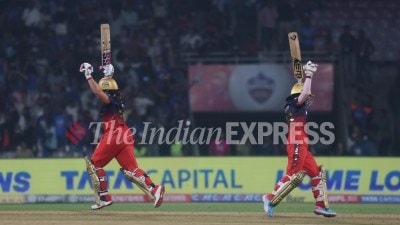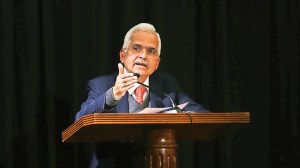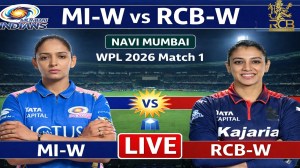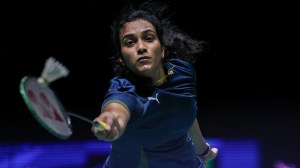One with the crowd: a view from the other side
No ticket to watch Germany beat Sweden but this reporter took a chance and, soon after kickoff, walked up to the stadium entrance.

No ticket to watch Germany beat Sweden but this reporter took a chance and, soon after kickoff, walked up to the stadium entrance. No one stopped me and so I walked on over the concourse to the seating area, parked myself behind the 8220;special needs8221; section and watched the match undisturbed. Standing room only but hey, what8217;s the World Cup if you have to watch it all sitting down?
The guys in front may have been in wheelchairs but their enthusiasm was in no way impaired. They couldn8217;t 8220;steht auf wenn ihr Deutsche seide8221; but they sang the songs. And I discovered that the German fans have a sense of humour too; some of it is lost in translation but there was the rude Ikea song Ikea being a reference to the Sweden-based lifestyle store and the proud Berlin song about Germany marching to Berlin, the venue of the World Cup final. Best was the one about the yellow submarine going down, sung to the Beatles tune and referring to the colour of the Swedish jerseys.
It8217;s a feeling you don8217;t get sitting in the more sedate environs of the press box, the amazing sense of being part of a mass; not an isolated individual reporting for a newspaper but a member of the soccer tribe, as Desmond Morris calls it. It8217;s easier, from this perspective, to understand though not condone 8211; the way fans behave after the match: all that adrenaline does not go away at the flick of a switch.
From the courts to the field
I got doubly lucky after the match, on my way down to the bus stand. Walking in front of me, on his own, was an eminently recognizable face from another sport. Much taller than I thought he8217;d be but the blond hair and slightly fish-faced look were unmistakeable: Boris Becker in the flesh. Breaking all journalistic convention I asked him for an autograph. This was, after all, the man who, while we were stuck with our Class 12 boards, was winning Wimbledon, at the same age! He complied willingly, then continued walking. Since my bus was in the same direction I walked alongside. Big mistake: What do you say after you say hello? Eventually, more to break the silence than anything else, I told him I was from India where, I didn8217;t add, he was shooting commercials long after his sell-by date on the pro circuit. He smiled and nodded but didn8217;t say anything. Mercifully the exit gate came to our rescue soon enough; he exchanged a cheery wave and a greeting with the volunteers on duty and walked off to his complimentary limo.
Becker is, of course, a huge football fan and a regular participant at charity matches. He played in the midfield for his hometown team, Leiman, at the age of 15 two years before raising a racket at Wimbledon. And he8217;s very much at home at the Allianz Arena, where I spotted him yesterday: He is on the financial board of Bayern Munich, who play at this ground.
A tale of two Adus
My travelling companion on the train from Augsburg to Kaiserslautern well, one leg of the complicated journey was Derek, an American real-estate agent with a more exciting past life as an executive for Universal Records. Here with his family just to see the World Cup, they missed the US matches but saw Germany last night, will see Switzerland on Monday and Brazil on Tuesday. His fascination with the sport stems from the fact that he lives in southern California, whose huge immigrant population makes it much less American or perhaps more so, in another way that the rest of the United States. Talking about the US team, he spoke at length on Freddie Adu, the teenage prodigy who, unlike his contemporary Theo Walcott, didn8217;t make the World Cup cut. Was Adu all he8217;s cracked up to be, I asked Derek; how would he be placed in context of other current prodigies? 8220;Right up there with them8221;, Derek said. 8220;I8217;ve seen him play against the LA Galaxy and some of the things he can do are pretty awesome.8221;
There is, of course, some resentment in his native Ghana which he left with his mother as a baby after winning a lottery to the US at the fact that he chose to represent his adopted country and not the land of his borth. Those Ghanaian journalists who were, in their enthusiastic way, criticizing him recently in conversation for that decision must be laughing at the irony that while the Adu-less US goes home, the Adu-less Ghana face Brazil on Tuesday. Either way the World Cup is the poorer, though there8217;s no doubt that, given his age, he8217;ll play in his share of World Cups. And he should become more familiar to Indian viewers once he makes his inevitable shift to a European club.
- 01
- 02
- 03
- 04
- 05































